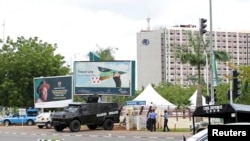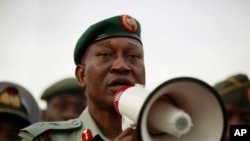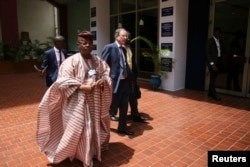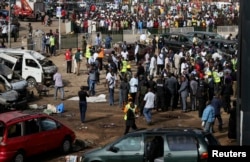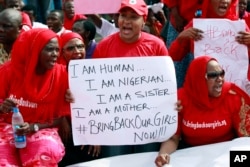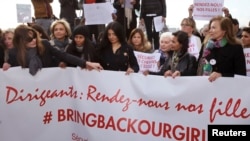ABUJA —
The World Economic Forum on Africa opens in Nigeria's capital today amid growing despair over hundreds of schoolgirls still missing after being kidnapped by Islamist militants three weeks ago. Analysts say the event highlights Nigeria's increasing duality: It is the biggest economy in Africa, but authorities can not even keep children safe in their schools.
In five years of insurgency, emotions have never been more raw in Nigeria than the past three weeks as the country waits and prays for the rescue of the girls.
Protests have grown bolder and the government does not seem to, or cannot object.
Major General Chris Olukolade, the director of defense information, stands by quietly until protest leaders hand him the bullhorn at a protest Tuesday evening outside army headquarters.
“Be sure that we listen to you and your protest is understood. Thank you," he said.
He promises to meet privately with protest leaders to discuss the rescue of the girls.
Boko Haram, a Islamist militant group, claims to be holding the girls as “slaves” to be sold at the market.
“All we are saying is bring back our girls," sing the protesters. "Alive! Now! All we are saying is bring back our girls. Alive! Now!”
The next morning, the city is quiet as the World Economic Forum on Africa opens. Schools, government offices and many businesses are closed.
The roads are mostly empty, but the number of large black SUVs and truckloads of heavily armed soldiers is notable.
More than a thousand business leaders, officials and heads of state gather in Abuja’s posh hotels for the first day of the forum. They discuss not just how to grow African economies, but how to include the regular people in growth on the world’s poorest continent.
“The March news about Nigeria becoming Africa’s largest economy, the hosting of the World Economic Forum at the same time that this security situation is evolving, potentially escalating, it really highlights the stark contrast that you have in Nigeria. It really is a country of extremes," said Elizabeth Donnelly, a research fellow at Chatham House, a London-based think tank.
Outside the hotels, military men wear flak jackets, aware that this international conference would be an obvious terrorist target, and they would be the obvious victims.
Campaign of terror
Boko Haram has killed thousands of people in five years of insurgency, including hundreds of school children.
Last month nearly a hundred people were killed in bombings just outside the capital and Boko Haram has threatened more attacks in Abuja.
Some activists say the security personnel amassed for the forum should be out searching for the girls.
“It’s very painful because we have a crisis on the ground that we need something to be done about the girls by now,” said Candy Nathan at a protest, now known as a #BringBackOurGirls rally.
Forum, a prestige event
Other protesters say the economic summit will boost Nigeria’s international prominence and its economy, a task that should not stop because of terrorists.
Ojonwa Miachi is an activist carrying a sign that says “Bring back our girls. Now and alive!”
“I feel that the World Economic Forum, it’s a symbol that… life can’t stop. The country has to run and the country has go on. The country has to also find its girls,” said Miachi.
Eight more girls were kidnapped Tuesday in northeast Nigeria, a region where three states have been under emergency rule for almost a year. On Tuesday, Nigerian President Goodluck Jonathan announced the United States had offered to send “security personnel and assets” to help rescue the girls and Nigeria accepted.
In five years of insurgency, emotions have never been more raw in Nigeria than the past three weeks as the country waits and prays for the rescue of the girls.
Protests have grown bolder and the government does not seem to, or cannot object.
Major General Chris Olukolade, the director of defense information, stands by quietly until protest leaders hand him the bullhorn at a protest Tuesday evening outside army headquarters.
“Be sure that we listen to you and your protest is understood. Thank you," he said.
He promises to meet privately with protest leaders to discuss the rescue of the girls.
Boko Haram, a Islamist militant group, claims to be holding the girls as “slaves” to be sold at the market.
“All we are saying is bring back our girls," sing the protesters. "Alive! Now! All we are saying is bring back our girls. Alive! Now!”
The next morning, the city is quiet as the World Economic Forum on Africa opens. Schools, government offices and many businesses are closed.
The roads are mostly empty, but the number of large black SUVs and truckloads of heavily armed soldiers is notable.
More than a thousand business leaders, officials and heads of state gather in Abuja’s posh hotels for the first day of the forum. They discuss not just how to grow African economies, but how to include the regular people in growth on the world’s poorest continent.
“The March news about Nigeria becoming Africa’s largest economy, the hosting of the World Economic Forum at the same time that this security situation is evolving, potentially escalating, it really highlights the stark contrast that you have in Nigeria. It really is a country of extremes," said Elizabeth Donnelly, a research fellow at Chatham House, a London-based think tank.
Outside the hotels, military men wear flak jackets, aware that this international conference would be an obvious terrorist target, and they would be the obvious victims.
Campaign of terror
Boko Haram has killed thousands of people in five years of insurgency, including hundreds of school children.
Last month nearly a hundred people were killed in bombings just outside the capital and Boko Haram has threatened more attacks in Abuja.
Some activists say the security personnel amassed for the forum should be out searching for the girls.
“It’s very painful because we have a crisis on the ground that we need something to be done about the girls by now,” said Candy Nathan at a protest, now known as a #BringBackOurGirls rally.
Forum, a prestige event
Other protesters say the economic summit will boost Nigeria’s international prominence and its economy, a task that should not stop because of terrorists.
Ojonwa Miachi is an activist carrying a sign that says “Bring back our girls. Now and alive!”
“I feel that the World Economic Forum, it’s a symbol that… life can’t stop. The country has to run and the country has go on. The country has to also find its girls,” said Miachi.
Eight more girls were kidnapped Tuesday in northeast Nigeria, a region where three states have been under emergency rule for almost a year. On Tuesday, Nigerian President Goodluck Jonathan announced the United States had offered to send “security personnel and assets” to help rescue the girls and Nigeria accepted.




